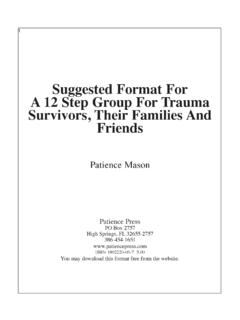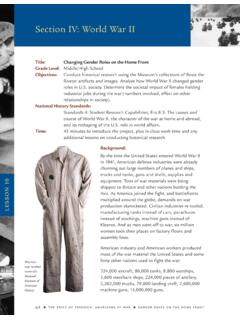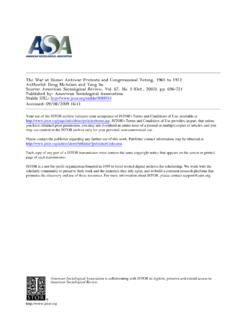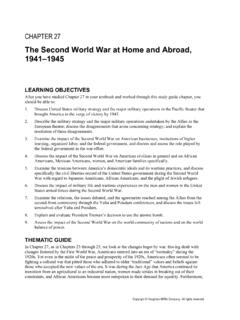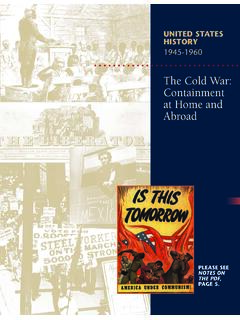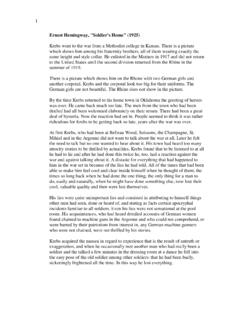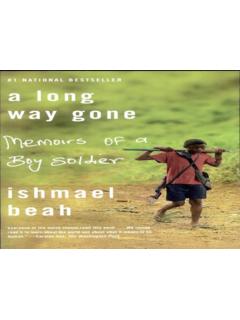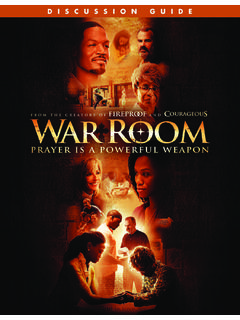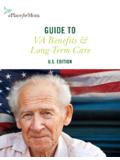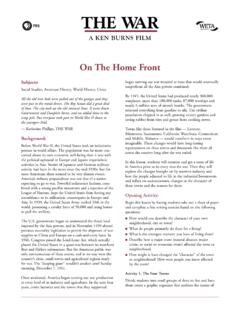Transcription of The War at Home Patience H C Mason
1 The War at home Patience H C Mason 2001 Patience H. C. Mason , revised 2011. All rights reserved. No portion of this publication may be reprinted without express written permission of the author, which you have if you are a veteran, trauma survivor, family member, friend or therapist and keep this copyright notice on copies you give away. War affects normal people with lasting reactions which are often misunderstood and personalized. Veterans who come home and can t sleep, have intrusive memories and nightmares, stay angry all the time, live like there s no tomorrow, avoid stuff that reminds them of the war, and feel numb also feel nuts. They stop talking about what is going on with them. They may believe they are weak and different.
2 They certainly have no idea from the military or society that other people are also affected, or if they do, they think it is weak to be affected and they should be over it. The phony statistics created by studies funded by the military and the VA contribute to this. Spouses are equally ignorant and assume I m a bad wife or he wouldn t be having problems, or I m not a bad wife so he shouldn t be having problems. Or they assume he doesn t love me anymore. Vets sometimes agree. What do they know? Most have no idea that their reactions are related to the war. Almost no one knows what PTSD symptoms are much less understands where they come from or what their functions are. There was not even such a diagnosis till 1980. Misunderstanding and personalizing PTSD symptoms can lead to a lot of fighting and blaming between spouses or family members, because they haven t a clue.
3 Even when they find out about PTSD, knowing it has a name is a relief, but they still struggle over what to do about the symptoms. Spouses and other family members may develop patterns that make it hard for veterans to recover. One of them is telling the veteran what to do. In war, control was taken away. Bullets smashed through their wishes and their friends. They were told where to go and what to do. Even if you are telling the vet the right things to do, it is ineffective, because veterans need to regain a sense of control of their own lives. Here are a few ideas to think about: Although PTSD did create many problems for us, PTSD is not the problem. War is the problem, and PTSD is a solution to the problems of war. PTSD symptoms start out as appropriate and effective survival skills, which kept our vets alive and functioning.
4 If you are reading this, they worked. Think about it. You or your spouse or son or daughter survived episodes in which other people died. It is the bottom line. It gives you a different perspective. PTSD symptoms kept the vet alive so they are hard to give up. They aren t personal attacks no matter how personal they may feel. And they do feel personal sometimes even when you understand them. You may feel attacked, but you don t have to believe a symptom is an attack. It may have nothing to do with you. This way of looking at the symptoms also protects the spouse and family members because the vet s PTSD symptoms are the vet s problems, not a reflection of the other s worth. Still, when people are depressed and feeling bad about themselves, they often become extremely critical of family members.
5 Not taking this personally is extremely hard without outside help. I use Al-anon. PTSD symptoms can be even more disconcerting if they suddenly appear many years after the war, usually after some other traumatic event. That is the post in PTSD. It is normal if not much fun. Survival skills which are appropriate and effective in war can become big problems later, especially for the family. How are these symptoms affecting your nearest and dearest? How does it feel when your spouse is emotionally numb? Most veterans haven t really thought about it. Think about it now. Seeking help is something veterans with PTSD need to do, because otherwise your spouse and/or family will believe that you don t care enough to make the effort to change. This pamphlet is designed to familiarize you with symptoms you may never have heard of nor realized were post-traumatic reactions.
6 It will help you see how they affect others. When you begin to look for help, the veteran and family can work together to find harmony and healing. Your relationship can become a safe place instead of a battleground. Most people with PTSD need therapy with a person with whom they feel comfortable. Little help is available for wives or mothers and fathers which is why I suggest Al-anon, which is free and available everywhere. Substitute PTSD for alcohol and it works. The veteran will feel worse before he gets better because he will begin to feel the pain he has avoided for years. This hurts us wives, partners, parents, to see you in pain. Think of how you felt seeing wounded guys. That s how we feel. Both of you have to be prepared for that and both need support.
7 Supporting each other is important. Help is, too. So what happens to people in war? At the moment of initial violence, the normal person s whole brain very appropriately focuses in on survival. Two of the sets of symptoms, numbing and hyperarousal, start simultaneously in those moments of overwhelming action. The brain narrows its focus to survival information and disregards everything else. Extraneous thoughts and feelings drop from awareness (numbing). Body and brain flood with adrenaline, reflexes quicken and paths in the brain are activated that will be with the vet for the rest of his or her life (hyperarousal). These reactions are normal. They evolved to keep you alive and doing your job. They are effective. If you are reading this, they worked.
8 The third set of PTSD symptoms, re-experiencing, is the one psychiatrists noticed first. It is partly your brain s better-safe-than-sorry warning system trying to keep you safe after you have experienced a series of traumatic events such as a war. Fragments of memory are stored in what used to be called the reptile brain which can t tell time and does not speak English. It does not know you are home . War is often described as a separate reality, one in which you may continue to live even though it is over. Civilians usually don t understand this, which is natural since they only know the reality of civilian life. Re-experiencing also contains a message from your inner self that something bothered you, which is important information if you think it didn t bother me.
9 Let s go through the symptoms one by one. What these symptoms did for the vet during the war and after, what do they do to the vet now, and how family members might react to each one. In the diagnostic criteria for PTSD, the symptoms look like a random collection of weird reactions. My listing, in a different order, is based on my asking myself, what function would this serve? From that I have developed what I think is the natural progression of symptoms. I think it makes much more sense than the diagnostic criteria. 1. Hyperarousal symptoms keep you alive in war. Psychiatry recognizes five symptoms in this category, although you only need two to fit the diagnosis (a) exaggerated startle response: The word exaggerated in the diagnostic criteria shows that even professionals who care about people with PTSD can t understand the reality of what it takes to stay alive in war.
10 It is not exaggerated. It s effective startle response! It s survival. What it did for you: An instant startle response is an appropriate response to being shot at. It keeps you alive. Adrenaline gets your body moving before the frontal lobes where you think can engage. Your heart rate shoots up. Time may slow or speed up. You may only have one sense operating (sound or sight or even smell). The big muscles of your body operate at their highest performance level. Every bit of this is designed to keep you alive, and if you are reading this, it worked, so it was effective. Repetition ingrains it. What it does to you today: Hitting the ground at the sound of a backfire is embarrassing and may lead you to isolate and avoid people. Hitting your wife when she touches your back unexpectedly, or touches you while you re sleeping, is deeply humiliating, shaming and frightening to both of you.

